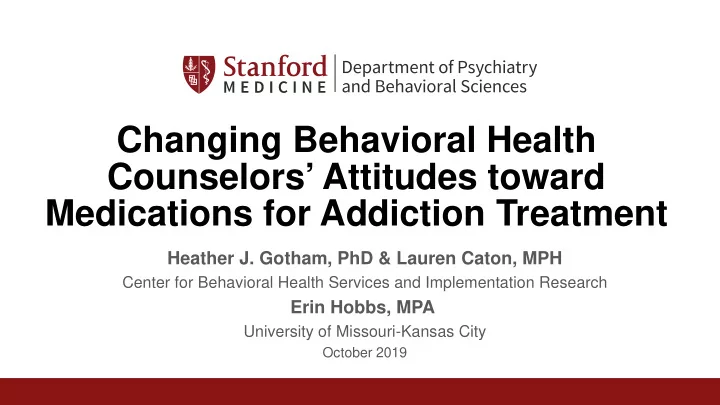

Changing Behavioral Health Counselors’ Attitudes toward Medications for Addiction Treatment Heather J. Gotham, PhD & Lauren Caton, MPH Center for Behavioral Health Services and Implementation Research Erin Hobbs, MPA University of Missouri-Kansas City October 2019
Background Few patients with opioid use disorders (OUD) and/or alcohol use disorders (AUD) receive medications for addiction treatment (MAT). Few addiction treatment programs provide MAT. › 33% of facilities provide MAT for OUD (N-SSATS; SAMHSA 2019) Behavioral health and health professionals’ attitudes toward treatments for addiction can impact the accessibility and uptake of these effective treatments. There is some evidence that online training and other types of education can affect attitudes toward MAT (Matejkowski et al., 2015; Ober et al., 2017).
Supporting Recovery with Medications for Addiction Treatment - www.HealtheKnowledge.org 3.0 hour, self-paced course for non-prescribers Developed through SAMHSA-NIDA ATTC Blending Initiative Enhance professional knowledge of MAT, and build skills related to reaching and educating clients about MAT Learning Objectives: › Describe medications approved for OUD and AUD › Identify workforce, organizational, and environmental/regulatory issues that facilitate or impede the implementation of MAT › Model ways to overcome barriers to clients’ use of MAT and build awareness of MAT among clients, their friends and family, and the community
Study Aims Examine attitude changes following completion of a free, 3-hour, publically available, self-paced online training course Examine differences between groups of professionals in attitudes and change in attitudes post-course.
Methods 5,797 learners completed pre/post-course surveys (Aug 2017 – Dec 2018) Pre-post survey › Demographics › Attitudes toward medications • Perceived effectiveness of individual medications – Based on work by Knudsen, Abraham, Aletraris, Roman, et al. • Abstinence Orientation scale (Gjersing et al., 2007) – Modified for MAT instead of methadone – Higher scores equal more positive attitudes toward MAT – Coefficient alpha for sample = .836 › Role in educating patients about MAT
Results - Participants Current sample, n = 4,159 › 2,976 Counselors (substance use and mental health) › 930 Social workers › 253 Nurses 1% Gender Age Female 29% › Mean = 44.2 (SD = 13.8; 18-86) Male 70% Transgender
Results - Participants Race/Ethnicity (Mark all that apply) › 21% Black or African-American Education › 12% Hispanic/Latino › 2% Asian <Bachelors › 1% American Indian/Alaska Native 25% Bachelors › 65% White 51% >Bachelors 24% › 9% Prefer not to respond › (32% non-White) Why Taking the Course? › 59% Required for work
Pre-Course Perceived Effectiveness of Medications for OUD 50 40 Percent 30 20 Don’t Know Don’t Don’t 10 Know Know 0 Very Not At Very Not At Very Not At Effective All Effective All Effective All Naltrexone Methadone Buprenorphine N=4159
Pre-Course Perceived Effectiveness of Medications for AUD 50 40 Percent 30 20 Don’t Don’t Don’t 10 Know Know Know 0 Not At Very Not At Very Not At Very Effective Effective All All All Effective Acamprosate Disulfiram Naltrexone N=4159
Pre- to Post-Course Increase in Perceived Effectiveness of Medications for OUD 100 90 a a a a b 80 b 1 1 70 2 Percent 60 50 40 30 20 10 0 Counselors Social Workers Nurses Naltrexone Methadone Buprenorphine Pre = Solid, Post = Pale Counselors, n = 2976; Social Workers, n = 930; Nurses, n = 253
Pre- to Post-Course Increase in Perceived Effectiveness in Medications for AUD 100 90 a a a 80 a a a b b 70 1 b 1 Percent 60 2 50 40 30 20 10 0 Counselors Social Workers Nurses Acamprosate Disulfiram Naltrexone Pre = Solid, Post = Pale Counselors, n = 2976; Social Workers, n = 930; Nurses, n = 253
Results – Significant Increase in Openness towards MAT 5 4 Significant increase over time for all Mean 3 groups. No group x time interaction. 2 1 Counselors Social Workers Nurses Pre-Course Post-Course Repeated Measures GLM, Time effect p < .001
Results – Significant Change in Perceived Role Related to MAT Education Helping clients see similarities Helping clients differentiate between MAT and medications b/w MAT & other drug use. for other chronic conditions. Level of Importance Level of Importance 5 5 4 4 3 3 2 2 1 1 Counselors Social Nurses Counselors Social Nurses Workers Workers Pre-Course Post-Course Pre-Course Post-Course Repeated Measures GLM, Time effect p < .001
Conclusions Behavioral health counselors, social workers, and nurses are on the front- lines of addiction treatment and may have a significant effect on patients’ engagement in MAT. Compared to previous studies 10-15 years ago, few learners appeared to lack information to make a judgment on the effectiveness of treatment. This brief online course was effective in shifting attitudes to be more positive about MAT. › However, 20-30% of learners still reported that the medications were not effective. Online training can provide basic foundational education to staff, increasing positive attitudes toward MAT, which an agency/clinic can then improve upon through other interventions. › Pair education with organizational linkage (Friedmann et al., 2015) or MAT implementation strategies.
Contact Heather J. Gotham, PhD Clinical Associate Professor Center for Behavioral Health Services and Implementation Research Stanford University School of Medicine gothamh@stanford.edu Lauren Caton, MPH Clinical Research Coordinator Center for Behavioral Health Services and Implementation Research Stanford University School of Medicine lauren.caton@stanford.edu Erin Hobbs, MPA Associate Director of Program/Project Operations Collaborative to Advance Health Services School of Nursing and Health Studies University of Missouri – Kansas City hobbse@umkc.edu
Recommend
More recommend